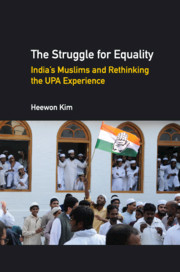Book contents
- Frontmatter
- Dedication
- Contents
- List of Tables and Figures
- List of Abbreviations
- Acknowledgements
- Introduction
- 1 Opening Up the ‘Black Box’ of Public Policy: Towards an Institutional Analysis of India's Policies on Religious Minorities
- 2 Constitution-Making, Equality of Opportunity and Religious Minorities: Reassessing the Critical Juncture
- 3 The UPA in Power: The New Equal Opportunities Framework, Religious Minorities and the Limits of Change
- 4 UPA, Muslims and Public Sector Employment: Assessing the Record
- 5 UPA, Muslims and Service Delivery
- 6 UPA, Muslims and the Communal Violence Bill
- Conclusion
- Appendix Recruitment of minorities in central government departments and public sector undertakings
- Bibliography
- Index
4 - UPA, Muslims and Public Sector Employment: Assessing the Record
Published online by Cambridge University Press: 12 February 2019
- Frontmatter
- Dedication
- Contents
- List of Tables and Figures
- List of Abbreviations
- Acknowledgements
- Introduction
- 1 Opening Up the ‘Black Box’ of Public Policy: Towards an Institutional Analysis of India's Policies on Religious Minorities
- 2 Constitution-Making, Equality of Opportunity and Religious Minorities: Reassessing the Critical Juncture
- 3 The UPA in Power: The New Equal Opportunities Framework, Religious Minorities and the Limits of Change
- 4 UPA, Muslims and Public Sector Employment: Assessing the Record
- 5 UPA, Muslims and Service Delivery
- 6 UPA, Muslims and the Communal Violence Bill
- Conclusion
- Appendix Recruitment of minorities in central government departments and public sector undertakings
- Bibliography
- Index
Summary
Introduction
Equitable representation of racial, ethnic, religious and other minorities in public sector employment is recognised as a key outcome of substantive equal opportunity policies. Such policies increase the access of previously excluded or under-represented groups to public sector employment and can be transformative in challenging cultures of exclusion (Ball and Solomos 1990). In India, the Constitution specified the percentage of reservations in public sector employment for SCs and STs (15 per cent and 7.5 per cent respectively) since 1970; they were extended nationally for OBCs in the 1990s. These measures are viewed as having contributed to significant improvement in the life chances of some of these groups. Recognising this fact and the gross underrepresentation of Muslims in public sector employment, the SCR called for ‘equity and inclusiveness’ in areas of ‘education’ and ‘employment’ (SCR 2006: 243), a recommendation supported by the RMCR.
This chapter presents a detailed case study of Muslim employment in central government during the UPA administration. Drawing on the framework of institutional policy analysis, it explores key decisions made by policy actors, the policy formulation process in Parliament and at the executive level, and the debate around reservations for minorities. It also assesses the utility and validity of employment monitoring data provided by the government. The policy process and the limited monitoring data available suggest that no appreciable inroads have been made into improving the availability and quality of employment of Muslims in the state sector. This outcome is not only the result of a lack of political will on the part of the UPA but also the product of entrenched institutional factors that have thwarted such change.
Agenda-setting
Both the SCR and RMCR—as well as previous surveys—acknowledge the gross under-representation of Muslims in public sector employment (ibid.: ch. 5; RMCR 2007: 152). This under-representation was found at all levels but was particularly striking in some of the large public sector undertakings. Nor was the picture noticeably different in the states: while the states in the south generally tended to have higher levels of representation than those in the north, nowhere (with the exception of Andhra Pradesh) did it match the actual Muslim share of the population in the state.
- Type
- Chapter
- Information
- The Struggle for EqualityIndia's Muslims and Rethinking the UPA Experience, pp. 93 - 126Publisher: Cambridge University PressPrint publication year: 2019



